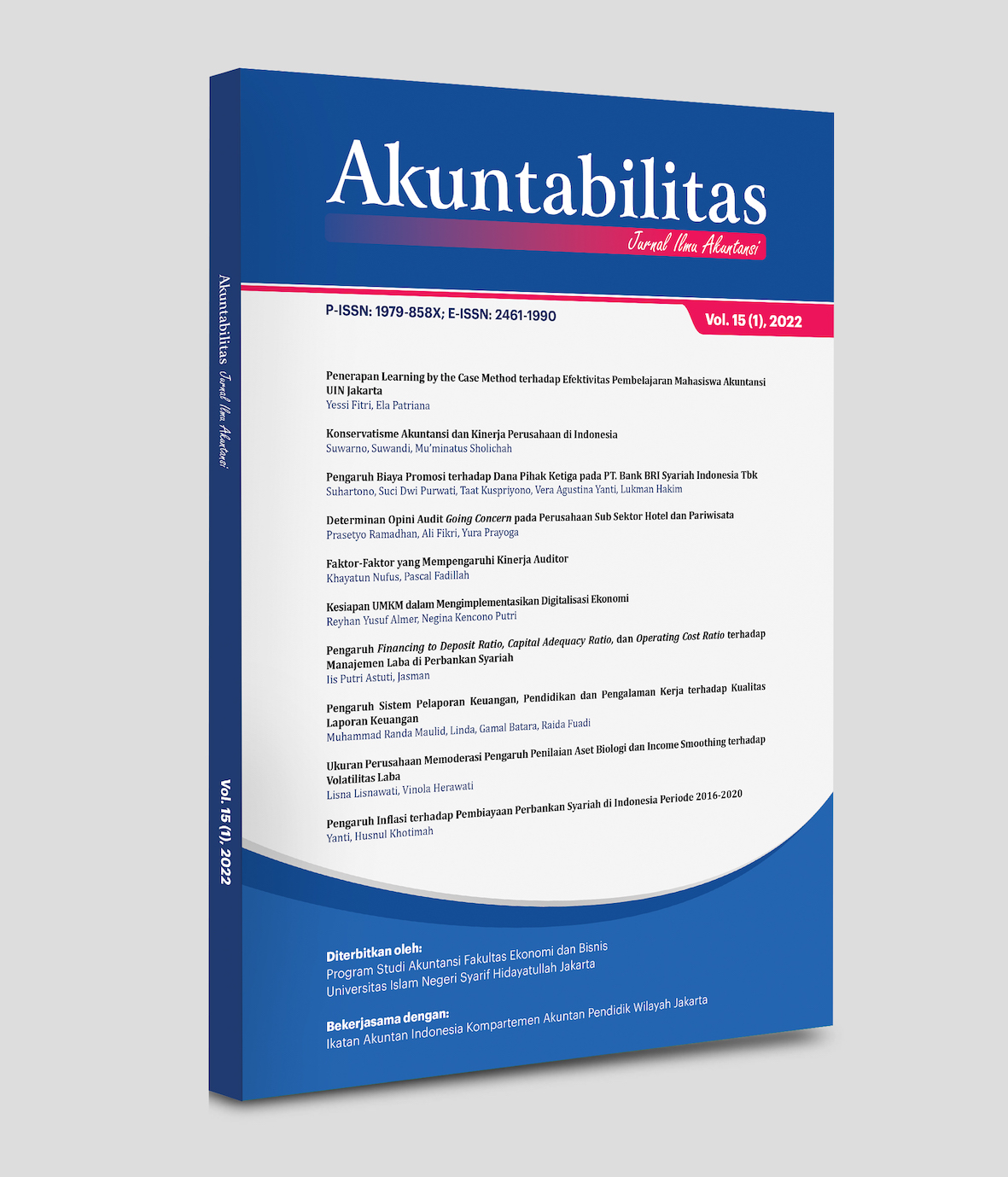Konservatisme Akuntansi dan Kinerja Perusahaan di Indonesia
DOI:
https://doi.org/10.15408/akt.v15i1.22152Keywords:
Accounting Conservatism, Company Performance, Company ValueAbstract
This study aims to confirm the relationship between accounting conservatism and the financial performance of companies in Indonesia in the 2019 period. Accounting conservatism is still debated between standard setters and accountants. The accountants argue that accounting conservatism is still needed to reduce the opportunistic behavior of managers. Meanwhile, accounting standard setters stated that accounting conservatism had an impact on biased financial statements. The research sample was selected with several criteria so that 564 companies were obtained. Panel data were analyzed by regression and the results showed that conservative accounting had an effect on Return On Assets (ROA). Accounting conservatism will reduce information asymmetry, which will reduce managers’ opportunistic behavior and increase investment efficiency and improve company performance. However, accounting conservatism has no effect on firm value (Tobin’s Q). Accounting conservatism will cause financial statements to tend to be biased because financial statements cannot describe the actual situation. Therefore, financial statements are not able to predict future cash flows.References
Ahmed, A. S., & Duellman, S. (2013). Managerial Overconfidence and Accounting Conservatism. Journal of Accounting Research, 51(1), 1–30. https://doi.org/10.1111/j.1475-679X.2012.00467.x
Aminu, L., & Hassan, S. U. (2017). Accounting Conservatism And Investment Efficiency Of Listed Nigerian Conglomerate Firms. Scholedge International Journal of Business Policy & Governance ISSN 2394-3351, 3(11), 167. https://doi.org/10.19085/journal.sijbpg031101
Aminu, L., & Hassan, S. U. (2018). Accounting Conservatism And Financial Performance Of Nigerian Deposit Money Banks: An Analysis Of Recent Economic Recession. Scholedge International Journal of Business Policy & Governance ISSN 2394-3351, 4(12). https://doi.org/10.19085/journal.sijbpg041201
Amran, N. A., & Manaf, K. B. A. (2014). Board Independence and Accounting Conservatism in Malaysian Companies. Procedia - Social and Behavioral Sciences, 164. https://doi.org/10.1016/j.sbspro.2014.11.095
Asri, M. (2017). The Effect of Accounting Conservatism on Earning Quality. SSRN Electronic Journal. https://doi.org/10.2139/ssrn.2992129
Beaver, W. H., Lambert, R. A., & Ryan, S. G. (1987). The information content of security prices. A second look. Journal of Accounting and Economics, 9(2). https://doi.org/10.1016/0165-4101(87)90003-6
Charitou, A., Lambertides, N., & Trigeorgis, L. (2007). Earnings behaviour of financially distressed firms: The role of institutional ownership. Abacus, 43(3). https://doi.org/10.1111/j.1467-6281.2007.00230.x
Da Silva, A., Ganz, A. S., Rohenkohl, L. B., & Klann, R. C. (2019). Accounting conservatism in complex companies. Revista Contabilidade e Financas, 30(79). https://doi.org/10.1590/1808-057x201806530
Donaldson, L., & Davis, J. H. (1991). Stewardship Theory or Agency Theory: Australian Journal of Management, 16(June 1991).
El-Habashy, H. A. (2019). The Impact of Accounting Conservatism on Corporate Performance Indicators in Egypt. International Journal of Business and Management, 14(10). https://doi.org/10.5539/ijbm.v14n10p1
Fariz, N. M., Mohammed, N. F., Zulkepli, N. S., & Kamaluddin, A. (2020). Accounting conservatism and financial performance: Accountability of shariah compliant companies in Malaysia. Humanities and Social Sciences Letters, 8(3). https://doi.org/10.18488/JOURNAL.73.2020.83.280.297
Francis, R. N., Harrast, S., Mattingly, J., & Olsen, L. (2013). The relation between accounting conservatism and corporate social performance: An empirical investigation. Business and Society Review, 118(2). https://doi.org/10.1111/basr.12008
García Lara, J. M., García Osma, B., Penalva, F., Garcia Osma, B., & Penalva, F. (2016). Accounting conservatism and firm investment efficiency. Journal of Accounting and Economics, 61(1), 221–238. https://doi.org/10.1016/j.jacceco.2015.07.003
Givoly, D., Hayn, C. K., & Natarajan, A. (2007). Measuring reporting conservatism. Accounting Review. https://doi.org/10.2308/accr.2007.82.1.65
Hellman, N. (2008). Accounting Conservatism under IFRS. Accounting in Europe, 5(2), 71–100. https://doi.org/10.1080/17449480802510492
Hsieh, C. C., Ma, Z., & Novoselov, K. E. (2019). Accounting conservatism, business strategy, and ambiguity. Accounting, Organizations and Society, 74(643010), 41–55. https://doi.org/10.1016/j.aos.2018.08.001
Khalid Latif, Ghulam Mujtaba Chaudhary, & Aon Waqas. (2020). Relationship Between Accounting Conservatism and Investment Efficiency with the Moderating Role of IFRS Adoption in Pakistan. Journal of Accounting and Finance in Emerging Economies, 6(4), 1139–1150. https://doi.org/10.26710/jafee.v6i4.1471
Laux, V., & Ray, K. (2020). Effects of accounting conservatism on investment efficiency and innovation. Journal of Accounting and Economics. https://doi.org/10.1016/j.jacceco.2020.101319
Li, H. (2020). Business Strategy, Accounting Conservatism and Performance. Accounting and Finance Research, 9(2). https://doi.org/10.5430/afr.v9n2p23
Ohlson, J. A., & Feltham, G. A. (1995). Valuation and Clean Surplus Accounting for Operating and Financial Activities. Contemporary Accounting Research, 11(2).
Razzaq, N. (2016). Accounting Conservatism Alleviates Firm’s Investment Efficiency: An Evidence from China. International Journal of Business and Economics Research, 5(4). https://doi.org/10.11648/j.ijber.20160504.12
Regina, R. (2021). The influence of intellectual capital, good corporate governance and accounting conservatism on company’s financial performance. Journal of Islamic Accounting and Finance Research, 3(1). https://doi.org/10.21580/jiafr.2021.3.1.7316
Sana’a, N. M. (2016). The effect of accounting conservatism on financial performance indicators in the Jordanian insurance companies. Journal of Internet Banking and Commerce, 21(1).
Watts, R. L. (2005). Conservatism in Accounting. SSRN Electronic Journal. https://doi.org/10.2139/ssrn.371820

